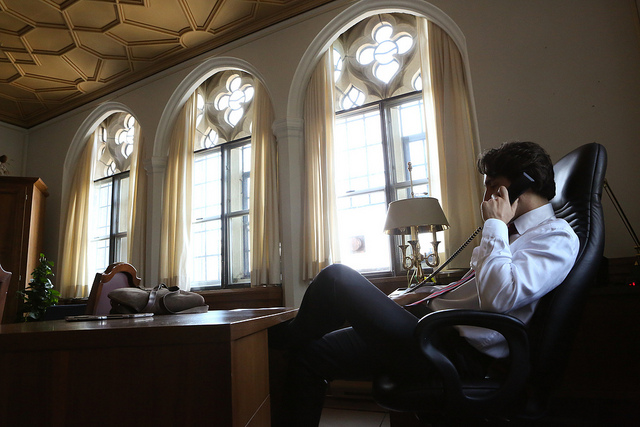rabble is expanding our Parliamentary Bureau and we need your help! Support us on Patreon today!
Following recent votes in the United Nations in November, it looks like Justin Trudeau’s Liberal government is continuing a hard-line pro-Israel stance that was a major staple of the previous Harper government’s foreign policy.
A former government official, who is intimately familiar with Middle East and Jewish community issues, says that the Israel lobby organization, Centre for Israel and Jewish Affairs (CIJA), has been bruised by its history of pro-Conservative partisanship in face of a different party coming to power in Ottawa following the Oct. 19 federal election.
“If the Liberals were to change direction on Israel, then CIJA would have a cause. But the Liberal government will not change its policy towards Israel, so CIJA faces disaster: It is a Conservative organization trying to work with a pro-Israel Liberal government, and CIJA is simply left without any meaningful role to play,” says my source who wishes to remain anonymous.
At the same point, the appointment of University of Ottawa’s director of the Centre for International Policy Studies Roland Paris to the senior advisor to Trudeau does presage a return to a friendlier international posture for Canada.
There was a “distrust of diplomacy,” under Stephen Harper, Paris has stated publicly. “We should uphold Israel’s right to exist and its security, but without diminishing the rights of Palestinians,” wrote Paris as part of a wide-ranging pre-election open letter in the Literary Review of Canada.
On April 5 2013, Paris penned a Globe and Mail op-ed that laced into then-Conservative Foreign Affairs Minister John Baird for his diplomatically inappropriate meeting with Israeli Justice Minister Tzipi Livni in East Jerusalem.
“Any peace agreement between Israelis and Palestinians will have to address the city’s contested status. Partly for this reason, Canada has maintained a longstanding policy of not meeting with Israeli officials — or accepting Israeli government escorts — in the occupied territories, including East Jerusalem. These guidelines have reflected both Canada’s strong support of Israel and its commitment to international law and a just peace,” Paris wrote.
Yet, a centrist tone also underlay Paris’ 2013 article because nowhere did he mention or stress the experiences of Palestinian residents living under Israel military rule in East Jerusalem that include human rights violation, discrimination and killings by police and military force.
Nonetheless, Paris arrives in the PMO with a weighty resume that includes a stint as the university research chair in International Security and Governance at University of Ottawa and separate gigs as advisors to both the Department of Foreign Affairs and the Privy Council Office.
Furthermore, Paris was part of a panel of experts advising NATO on the future of the transatlantic partnership.
How Paris, who is directly advising Trudeau in his new appointment, will relate to Stéphane Dion, the newly appointed foreign affairs minister is not clear. A recent Hill Times article suggests, the PM wants to get a handle on governing while the recently appointed cabinet ministers get set up with new staff.
Another perspective comes from a keen observer of Canada’s Middle East policy, President of Canadians for Justice and Peace in the Middle East Thomas Woodley. He cannot comment on the Paris appointment but suggests that Dion is probably more even-handed on the subject of Israel-Palestine.
Woodley speculates that Dion was probably constrained when Israel’s relationship with the Palestinians came up before the UN in November.
“Dion is a decent and thinking politician. While he might exercise more discretion — and manage votes differently — in the future, I suspect he wasn’t ready to fight a battle in his first month on the job,” Woodley told rabble.ca.
What is “encouraging,” he notes is that Trudeau unlike Harper did not come out afterward with a “strident” statement justifying Canada’s siding with Israel’s shrinking group of supporters led by the U.S. at the UN.
At the same time, the Canadian UN votes represented a “discouraging” development, says Woodley.
“If Liberals didn’t like the wording, or felt the resolutions were ‘not helpful’ [arguments used by both past Liberal and Conservative governments] — they should have abstained. Voting against the ‘message’ of the resolutions [e.g. support for Palestinian human rights, condemnation of Israel’s colonies, international status of Jerusalem, etc.] makes a strong statement.”
Michael Lynk, an associate professor of law at Western University and a specialist on international law, expresses a similar sentiment.
He says the content of the UN resolutions echoed mainstream positions of international diplomacy which is that the Jewish settlements on Palestinian land are an obstacle to peace and that the Palestine-Israeli conflict should be settled peacefully on the basis of international law.
“Then again, it is unsurprising, given that the political consensus among the three main federal parties is to provide substantial support for Israel, even at a time when Israel is ruled by the most right-wing government in its history,” adds Lynk.
What role the former Mount Royal Liberal MP Irwin Cotler still plays in advising the Liberals on Middle East is also unclear. He has tended in public statements to equate the boycott movement as a manifestation of global anti-Semitism.
“Mr. Cotler has been going around the world for the past 10 years advocating for an attack on Iran. This was not and is not Liberal Party policy. While the Liberal Party welcomed with caution Obama’s recent deal with Iran, Irwin Cotler was in lock step with Benjamin Netanyahu and vocally opposed it,” says Tyler Levitan, campaigns co-odinator for Independent Jewish Voices.
Meanwhile, at the Paris talks, Trudeau and Israel Prime Minister Benjamin Netanyahu apparently had a friendly half an hour chat. It is not clear that if they shared their thoughts on climate change, let along the Israel-Palestine impasse.
Paul Weinberg is a Hamilton-based freelance writer who can be reached at [email protected].
Photo: flickr/ Justin Trudeau
Irwin Cotler did not respond to request for interview before publication time.
Roland Paris is not conducting interviews at present time.



